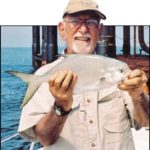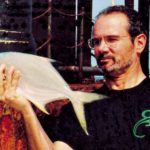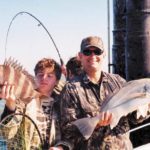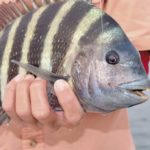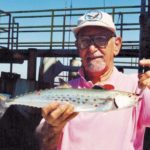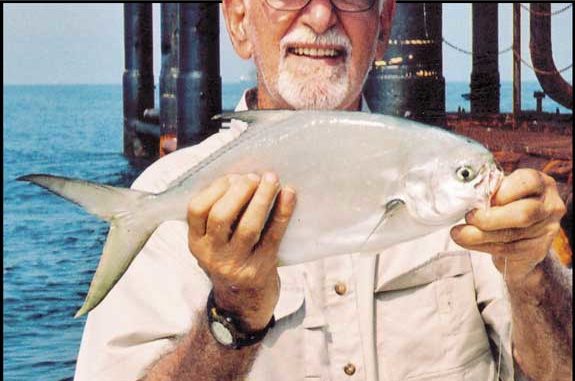
Forget fighting the inshore crowds for a few weak-fighting specks. Point your bow to the near-shore rigs, and you’ll be eating like a king.
We arrived at Doc’s French Quarter bungalow elegantly early only to find the place already packed. “Geezum,” snorted Pelayo at Fontaine. “I thought you said it was an exclusive affair this year?”
“This isn’t the half of it,” replied Doc. “Heck, half the guests already went down the street to Nick Scramuzza’s place. ‘Middle-Aged Housewives Gone Wild’ they’re calling the show down there. We’ll probably see all our friends’ wives on YouTube soon.”
“This grilled fish is delicious!” came a familiar female cry from the corner.
We looked toward the food table, and exactly as I feared: It was Priscilla (Yoko) still licking her fingers. Pelayo’s brother-in-law was in for Carnival, and he ambled over to Priscilla and her husband Wes (Doug Neidermeir).
“As delicious, in fact, as the less-criminal forms of sin,” Zach pronounced while nodding in front of them.
“What?” Yoko frowned as Wes shuffled tensely.
“I quote Mark Twain from his book, Life on the Mississippi,” answered Zach. “Twain was commenting on the pompano he feasted upon just a few blocks from here at Antoine’s in 1883.”
“Pompano?” chirped Priscilla, her gorgeous green eyes wide as she made it a point to avoid all our faces. “Sure, we’ve eaten it at Antoine’s and Broussard’s too, haven’t we, Wesley?”
Wes nodded meekly and looked down at his shoes. But Priscilla looked straight at Doc.
“Where’d you get pompano, Mitch? We’ve never been able to find it at any store or market.”
“Ask them,” and Doc pointed at Pelayo, Chris and me.
I looked over and saw Yoko’s lips curl.
“No store,” smirked Pelayo.
“No fancy food market either,” laughed Chris.
“We caught ’em,” I deadpanned.
“Caught ’em? You mean fishing?” frowned Yoko, finally acknowledging our presence. “Where? In Florida?”
“Yep, we caught ’em. But not in Florida. In fact, not far from where your camp and not far from where you and Wes always fish.”
“A fabulous sportfish as well as table fish,” pronounced Zach. “I’ve rarely enjoyed a fishing trip like the one last week to those ‘rigs,’ as you people call them. On every cast, I either caught a fish or got my line snapped. I’ve never experienced fishing like that in my life, and I’ve fished from sea to shining sea.”
Yoko pointedly ignored Zach, and moved over to the gumbo bowl. During the New Year’s party (which was prior to the Zach deer-camp episode), Yoko and Zach seemed to get along splendidly. Indeed, Priscilla claimed that Zach’s manner of speech reminded her of Ignatius Reilly.
Now she ignored him while ladling gumbo into a bowl.
“Oh my!” she said rolling her eyes after a long slurp. “Mitch you truly outdid yourself with this gumbo. Delightful! What heavenly ingredients are in it?”
“Heavenly wood ducks and heavenly squirrels!” laughed Pelayo, who had started on the Cuba Libres a tad before we arrived. “So you can thank Zach for the gumbo.”
At the comment, Priscilla slapped down her bowl, splashing a goodly portion on Doc’s linen tablecloth. Then she and Wes stormed out of the room.
That Zach considered himself even on speaking terms with Wes and Priscilla amazed us. The scene at their deer camp was only a few weeks old. And what a scene! Artie had somehow wrangled an invite for Pelayo and me, along with Zach, who was in from California for the holidays and Pelayo’s house guest.
Zach was in a stand about 300 yards from me, and not 15 minutes after sunrise, I heard a shot.
“Great!” I thought. “He got one!”
A minute later, I hear another shot! Thirty seconds later, another shot! A minute later, another one!
Now I got worried. Zach was hunting with a shotgun, the only firearm he’d brought from California. And with buckshot, I thought. So he was obviously reloading. Blam! Blam! Blam! The shots kept going off for almost half an hour until I decided to hump down the tree and head over. What on earth!!??”
Zach saw me crossing the slough, and came over triumphantly hefting his bag of two wood ducks and three fox squirrels in his right hand.
“Superb hunting around here!” he beamed. “Good thing I brought these game loads!”
“Let’s go! HURRY!” and I waved him over.
He seemed puzzled.
“RUN! Dammit!” I yelled “RUN! Let’s get outta here!”
I could hear the tell-tale rumble of an ATV coming from the west.
“What’s the problem?” gasped Zach as we scrambled through the muddy thickets. “Aren’t squirrel and duck seasons open? I checked them last night in my pamphlet, and they certainly seemed open.”
“No matter!” I gasped. “These people don’t like that around here! Say it scares the deer! Besides, this slough’s the lease boundary!!” I snarled as we trudged though the thickets, staying away from the trails. That ATV rumble from the neighboring lease side was getting closer and closer, and seemed to involve more than one vehicle.
We somehow eluded the neighboring club’s dragnet, and made it back to the camp. But as usual, we left Yoko and Wes’ deer camp in a very impromptu manner — and just as the neighboring club’s president roared in on his Hummer to pay a visit on Priscilla and Wes. Their discourse, we heard from Artie, got somewhat heated.
“Nothing early for us tomorrow, Doc,” Pelayo commented after he explained Priscilla’s reaction. “Perfect weather for shallow rig fishing, calm and warm. But this time of year that always means fog. So we probably won’t hit the shallow West Deltas ’til 10, maybe 10:30 or 11. That timetable lets us catch the balcony show tonight.”
We timed it perfectly, and the gnats that bedeviled us while launching made us jubilant that we were going (slightly) offshore. We cleared the Empire jetties, and ventured just past what was once known as the Green Monster, where the water finally got that greenish tint we like for late-winter fishing. The very conditions that would have skunked inside fishing that day made for ideal shallow-rig fishing. To wit: A slack tide inside means a slack current out here; hence your bait or jig stays close to the beams, where the fish tend to hang out, especially on the up-current side.
Recalling the previous week’s trip, Zach was frantic to get his bait in the water. He cast his shrimp-tipped double shad rigs to the corner of the rig, and started letting out a little line. Pelayo followed suit casting to the opposite corner. When Zach reeled in his slack, he felt pressure — and reared back as his medium spinning rod doubled over.
“Whoo hoo!” he bellowed. “Just like last week!”
“Sure is!” Pelayo yelled from the bow as he raised his bent rod overhead.
I looked down through the water, and shortly saw the tell-tale yellow fins and shiny body.
“Yep, we’re on ’em!” And I reached for the net. We take no chances on losing such a delectable fish while lifting him on board. Hence the net. Zach beamed from ear to ear as did Pelayo, who actually flipped aboard a nice Spanish mackerel.
“I’ll see if there’s a few more,” and I reached into the tacklebox for the small shad rigs.
My chum Ray Caballero actually fished pompano commercially for a stint, specializing in the rigs in 20- to 40-foot depths in the Breton Sound area. The shallow Main Pass blocks, in other words. He said you can’t beat a small-hooked, shrimp-tipped shad rig for these delectable fish. He advised to cut off the tail of the shad rig right at the end of the hook, too.
Pompano are crustacean — not fish — eaters. So forget any lure that mimics a small fish. Jigs heads (with the smallest hook available) are best, but always tipped with shrimp — always. We favor shad rigs, however. But not so much the ones out now called “Speck Rigs,” which have a large hook, as befits a speck’s mouth. The original shad rigs are best — the ones with the tiny hooks that we used to catch croakers and channel mullet as kids. Point is, pompano have small mouths.
I dropped the jig about 15 or 20 feet down. Bump-bump came the tell-tale nibbles. I jerked up.
“They’re here!” I howled as my rod dipped, and I started cranking. This sucker was battling it out, too. But it was a sheepshead. No problem. Still a delectable fish. On my next cast, my rod was almost jerked from my grasp, so I knew it was a Spanish. Pompano and sheepshead (and triggerfish and spadefish, also prized by us) all nibble. Spanish (and bluefish) whack it and zoom off, often with your whole rig.
Fluorocarbon leaders hold up better than mono to their teeth, but they’ll make off with a few jigs on every trip out here. What happens (as we’ve watched through the clear water) is that the Spanish are schooled up right now. And while one’s hooked another darts in and grabs the leader. So if you can avoid a swivel, all the better.
Another yellow-silvery fish appeared as I flipped my Spanish aboard. Yep, Pelayo had a pompano, which he jerked aboard without fuss. Zach was grunting from behind me.
“Wow! What’s this?”
And I looked over to see a gorgeous puppy drum.
“I’ll get the net.”
Can’t keep reds out here, but drum (equally delectable on the grill) stay right with us. That’s the beauty of this shallow-rig fishing this time of year: You never really know what you’ll haul up. But whatever it is, it’s absolutely dy-no-mite on the grill or in the frier.
These winter-caught, shallow-gulf pompano also seem fatter, the meat more marbled. This makes for self basting and an absolutely luscious fillet, either fried, broiled or grilled. The pompano’s fame comes precisely from this marbling, which makes it unfit for lengthy freezing but absolutely unbeatable on the grill or just sauteed in butter and lemon while fresh.
For winter pompano fishing, the rigs standing in 25 to 45 feet of water are best. This applies all along the Louisiana coast. Our favorites remain the West Delta rigs in these depth ranges, with the East Bay and Breton Sound rigs a close second.
In summer, pompano move in close to the sandy beaches (Timbalier, Grand Isle, Breton Island, etc.), and we occasionally catch them in these locales when trout fishing with live shrimp — but never with minnow-mimicking artificials, as befits their fondness for small crustaceans.
According to tomes by marine biologists, pompano inhabit deeper water (the rigs) during winter and spring, then return to the beaches for summer. But we also catch pompano fairly regularly during mid-summer — indeed, year round — at the above-mentioned shallow rigs. And while diving in summer, we often see schools. Winter pompano fishing is always best, however.
Official marine-biology wisdom also has it that sheepshead are only offshore in winter and early spring, while spawning. But anyone who has ever looked over the side of his boat while tied to a rig (and divers especially) knows that sheepshead absolutely swarm at the rigs from 20- to 150-foot depths year-round. As usual, the unique habitat provided by our rigs upends much marine-biology dogma.
We fished two rigs and one well-jacket (it doesn’t require a huge platform to concentrate these fish), and finished up with 14 pompano. Sheepshead, Spanish, puppy drum and one mangrove filled the rest of the box.
“The crowning glory of the New Orleans fish market” is how The Times-Picayune Creole Cookbook, circa 1911, describes pompano. “Nothing to be compared with pompano exists in northern, eastern or western waters, and no wise stranger leaves New Orleans without having tasted of this delightful fish — a dish a king might envy.”
The cookbook also spoke well of Spanish mackerel: “A delicate and delicious fish far superior to any mackerel in the world — on equal footing with the pompano.”
And the lowly sheepshead wasn’t considered so lowly back then: “Perhaps the most to be commended for frequent household use, being susceptible of a far greater variety of modes of preparation than any other fish. It is good in any form, broiled, baked, fried or boiled.”
But you should have seen the frowns and snorts when we showed off our box back at the marina.
“Y’all eat all dem things?” was a common remark, complete with frowns as they gazed in the box.
We reciprocated almost word for word when looking in their boxes. Most of these culinary geniuses had fished Yellow Cotton Bay and the Buras Canal. Their boxes contained a couple dozen small, feeble-fighting, parasite-ridden fish.
Fine with us.
